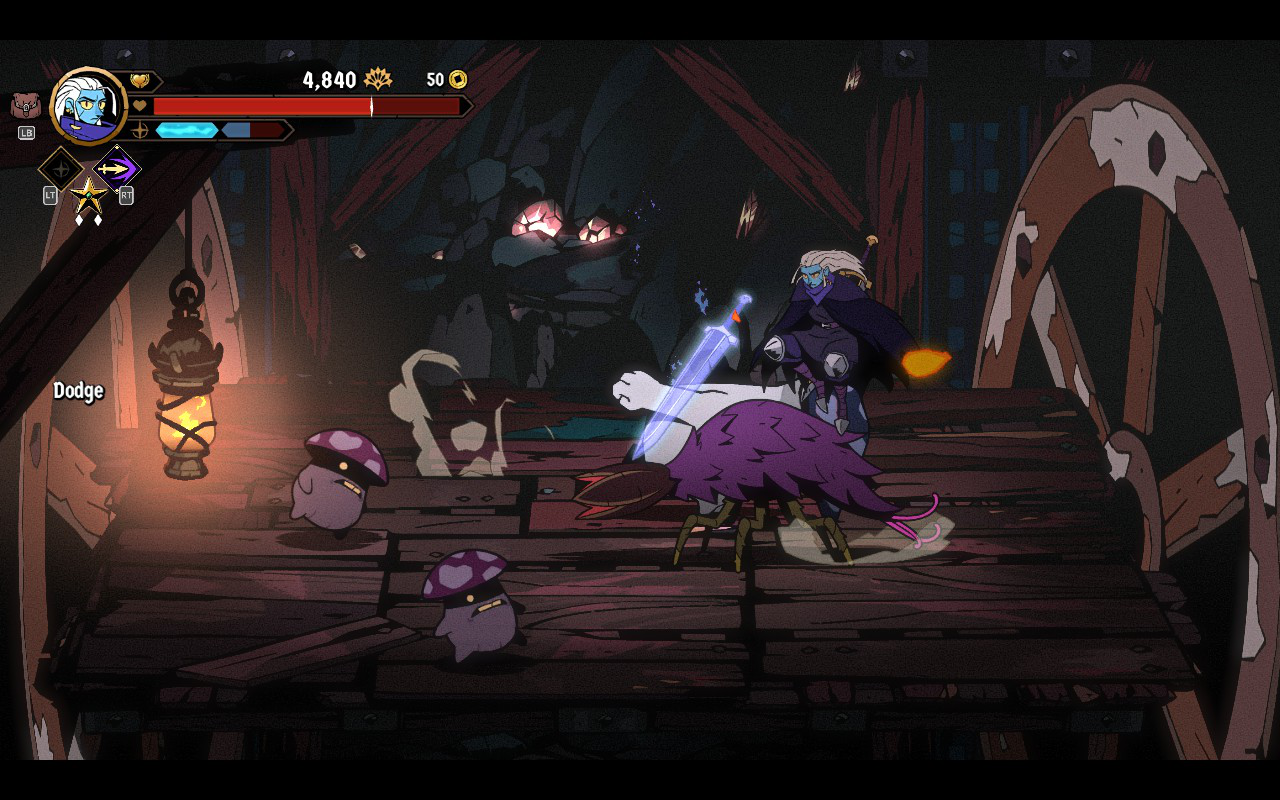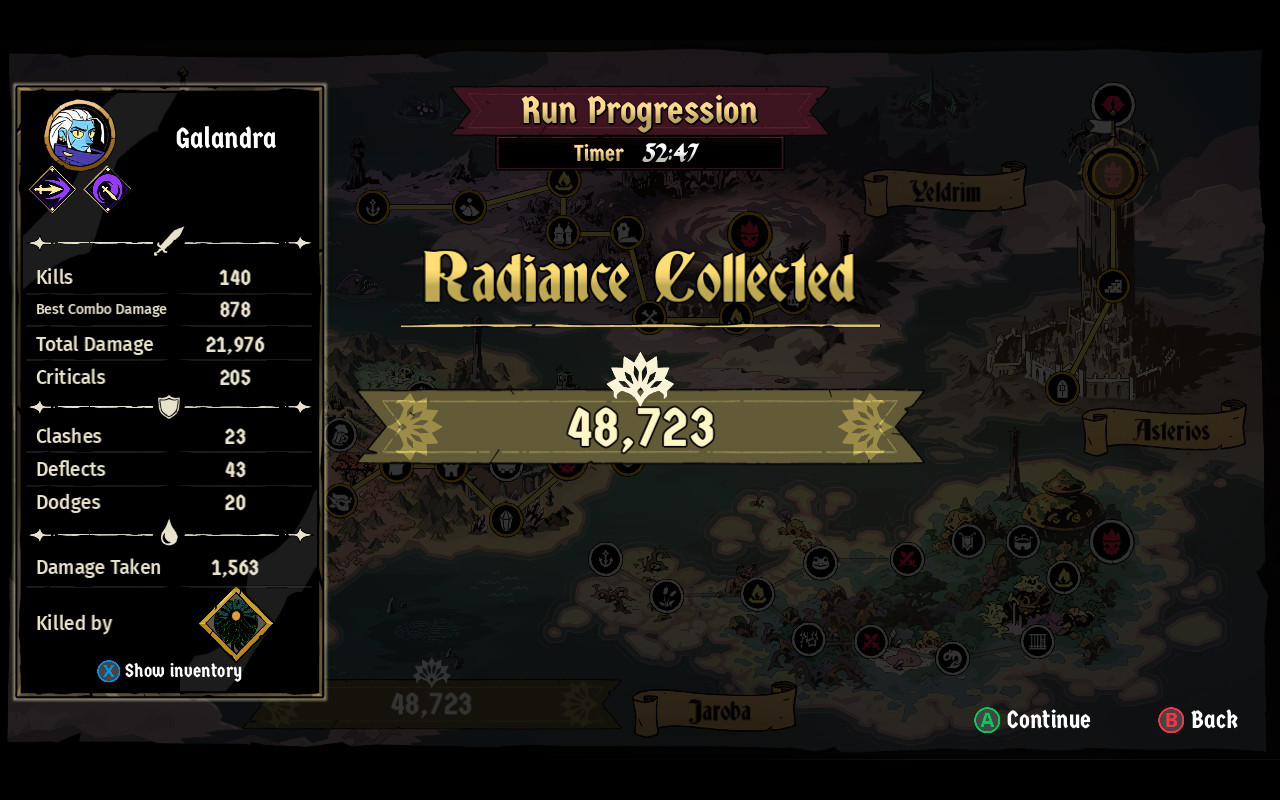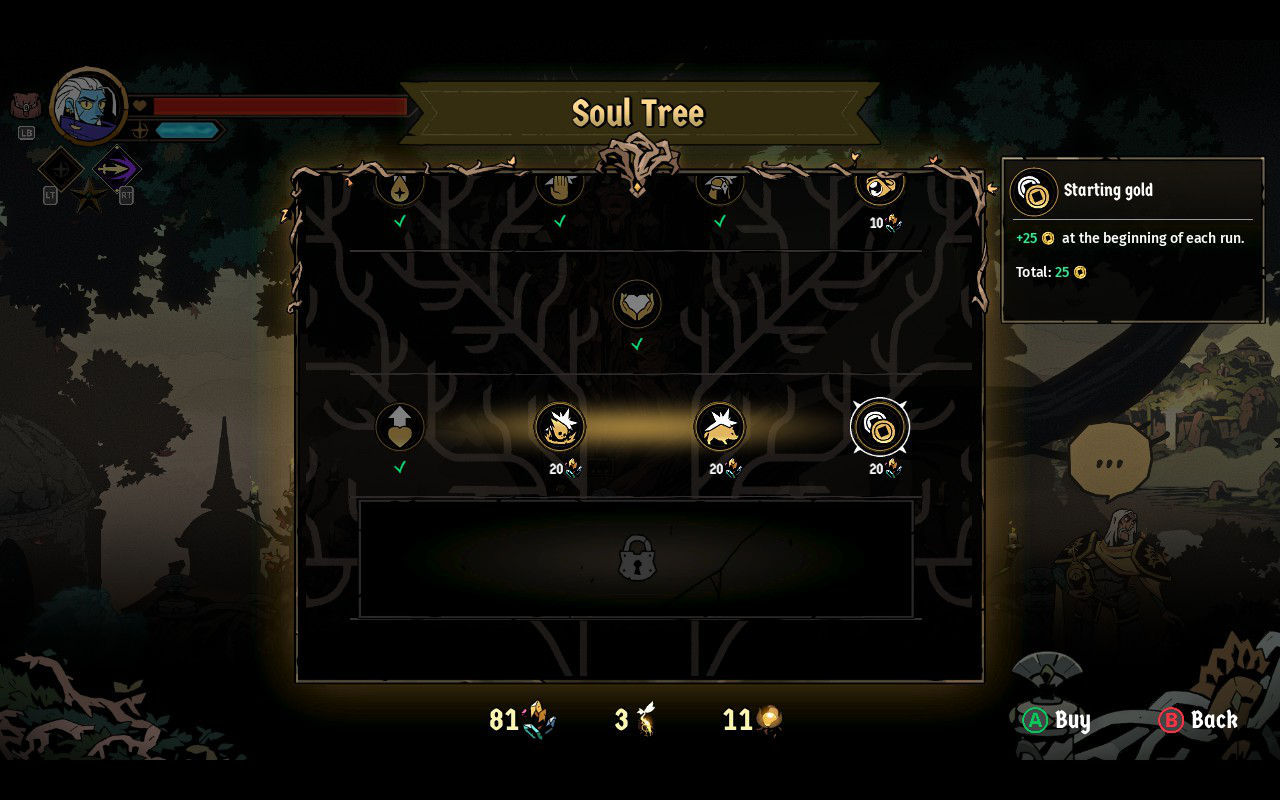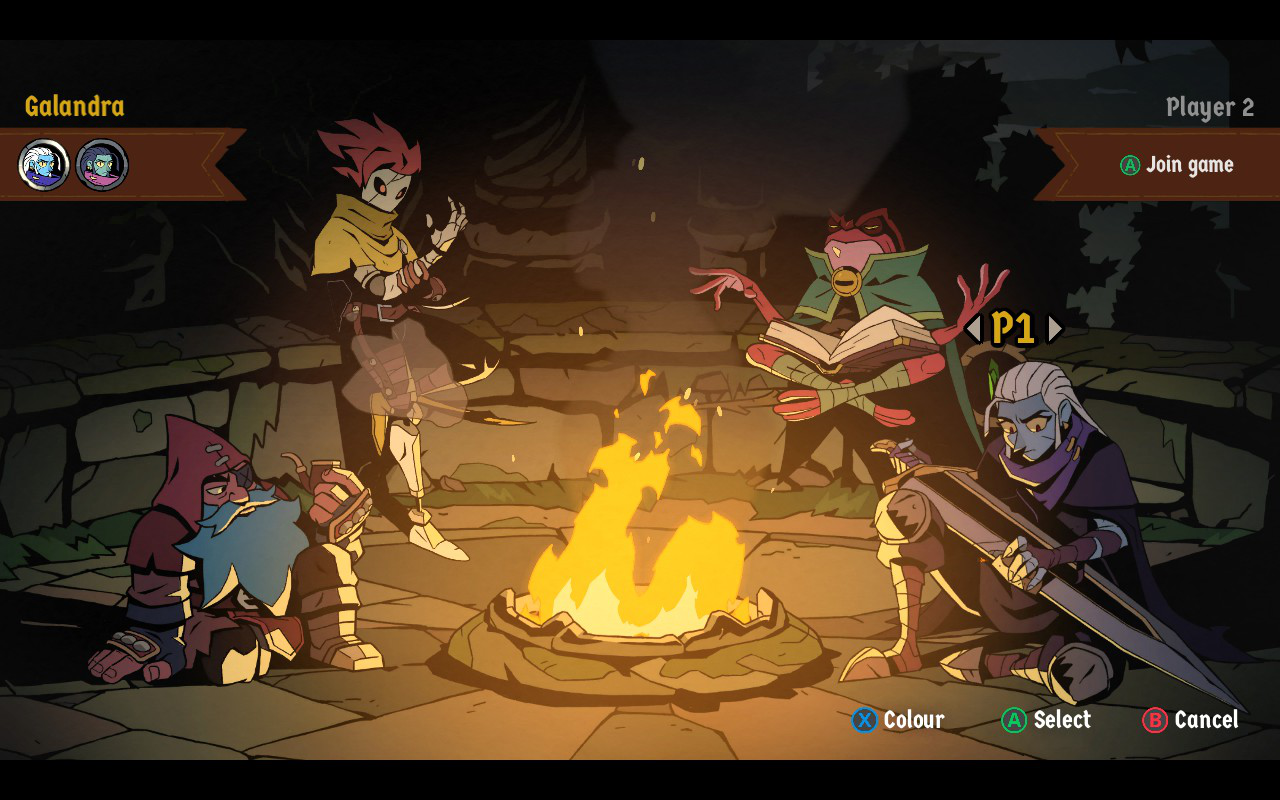Many games lately aim to be immortal. Whether they try to be “services” that funnel you into an endless loop of matchmaking and cash shops, dump you in giant open worlds, or procedurally generate gauntlets, the current gaming “meta” prioritizes taking up your time above all else. Absolum goes the procedurally generated route, injecting the beat-em-up formula of classic arcade games with randomly generated encounters, powerups, and item drops. I like a lot about Absolum, but above all else it made me think that eternal life doesn’t quite live up to the hype. Absolum demonstrates the pros and cons of immortality, ultimately resulting in an enjoyable experience that ironically has less of a shelf life than its arcade ancestors.
Before I get into that, I’ll note that Absolum absolutely nails the fundamentals. It looks great in motion and feels even better to play. The developers behind the game worked on Streets of Rage 4 (my personal favorite beat-em-up of all time) and their experience shines through every button you bash while playing. Like SoR4, Absolum grants the player tools to create big combos and easily control crowds, giving the combat system a technical appeal for genre veterans. Each character has a large and distinct arsenal of moves, providing a lot of nuance in how you both fight and traverse across the screen. Between the varied playstyles of the characters and the detailed art and animations bringing everything to life, it’s clear that a lot of love went into making sure the gameplay itself stands on solid ground.
One of the more distinctive twists to the combat system comes from Absolum’s defensive mechanics. Oldschool beat-em-ups rely on the player exploiting invincibility from grabs or simply controlling crowds well enough to avoid damage to begin with. In Absolum, attacks can be directly dodged or parried. Parries aren’t unique in the modern video game market generally, but to arcade-style beat-em-ups it gives the game a different feel from its contemporaries.

Importantly, Absolum avoids the major pitfall of modern parry systems. The parry has real weaknesses rather than having it be the be-all-end-all solution to your problems. Crowds can easily overwhelm you regardless of your timing and many attacks will stun you if you attempt to parry them. Due to these weaknesses, the combat avoids discarding the traditional beat-em-up fundamentals entirely, making for an interesting mix of old and new.
Beyond the basics, Absolum introduces random elements that will be familiar to anyone who has played a roguelike or two. Periodically as you progress through the game, you can pick from randomly selected power ups that affect your playstyle. Water-themed powers can trap enemies in bubbles, fire powers will add burn status effects to enemies you damage, and so on. As you acquire the power-ups, you can mix and match them to craft a “build” that synergizes the powerups effectively. I don’t mind the premise, but it can feel like the luck of the draw directs how you play in a heavy-handed way. I don’t always want to focus on throwing projectiles as my playstyle, but certain powerups can force you into playing ways you may not necessarily find fun.
Builds interest me far less than how the game handles its structure. A run in Absolum has you traverse three regions and defeat the final boss. While that sounds simple enough, the details of that journey can differ greatly in ways you can and cannot control. Each region features multiple opportunities to take branching paths, leading to entirely distinct areas. On top of that, the same areas may feature new enemy formations or hazards on subsequent runs.

The flexibility of the world is where Absolum’s random nature shines the brightest. Giving the player so much control over how they approach the game, both in terms of the routes they take and even the regions they choose to tackle, makes the game feel like a grand adventure.
Beyond that, you can complete a multitude of quests during your runs that further change the game world. Sometimes you’ll open up shortcuts or new areas for subsequent runs after helping someone out, while completing others can dramatically alter existing areas. One of the ongoing questlines in the early game involves the relationship between human and goblin societies – as you progress you can connect them for a handy shortcut, only for it to later result in the destruction of the human town entirely. Seeing how the world evolved ended up being one of the coolest features of the game.
In a lot of ways, Absolum makes good on the promise of an infinitely exciting game that these randomly generated games try to sell themselves as. Providing for so much variation, especially variations you can directly control, cleverly expands the scope of the game without needlessly bloating its length.

Unfortunately, Absolum opts to needlessly bloat its length anyway. My major problem with Absolum has less to do with it being a roguelike and more about the baggage that tends to come with these types of games. Roguelikes often sell themselves on the concept of “replayability,” but what they don’t mention is that it tends to be a particular brand of it that I’ll call “forced replayability.” Basically, most roguelikes decide that it isn’t enough to rely on the game itself being fun to replay on its own merits, and instead they’ll find ways to force you to keep playing it. This often comes in the form of doling out permanent upgrades to your character as you play the game, giving you an ever-dangling carrot on a stick to incentivize trying one more run. Absolum is no exception, rewarding you with major stat buffs, extra lives, and access to better drops the more you play.
As a consequence, Absolum falls into a balancing trap that I absolutely despise. Absolum essentially makes it impossible to complete the game without grinding up multiple runs until you have a sufficient amount of bonuses to make it winnable. It’s kind of like a reverse difficulty curve from how skill-based games are normally designed. Rather than starting easy and escalating in difficulty, the game sets itself at max difficulty from the start while slowly lowering individual difficulty points (not unlike dip switches in an old beat-em-up arcade cabinet) until you can win. I don’t find this kind of design satisfying, particularly in conjunction with the random elements inherent to roguelikes – it makes it nearly impossible to decipher whether a successful run was due to skill, luck, or sheer grinding perseverance. And the equation only gets muddier the more you play.
But hey, you may be thinking, maybe I'm just bad at video games? I already considered and rejected this theory. One, I am actually pretty good at video games and I’m particularly good at beat-em-ups. You’ll just have to take my word for it. Or check my PSN trophies or something. More importantly, I noticed basically from the get-go that I was struggling with the first boss of the game, despite easily breezing through the encounter in the preview build. What was the difference? The preview build I played already started me with several layers of upgrades unlocked. After a run or two with some upgrades built up, I no longer had any problems. Interesting how that works!
If you don’t believe that Absolum prioritizes the grind above all else, then I’ll have to pull out my trump card and talk about the last boss of the game. Don’t read the next paragraph if you don’t want that spoiled. Or do, honestly, because I recommend knowing this ahead of time so you don’t make the same mistake I did.

Once you complete the game once, you find out that actually you need to beat the game again to fight the real final boss. Kind of obnoxious already, but sure. I immediately started another run, but died early due to the game introducing a new extra-hard challenge that I wanted to try out. No problem, I had unlocked one extra life from the progression system. I decided to carry on and actually ended up all the way at the end to fight the final boss.
Just before the fight, a merchant warned me that the boss had a fatal scream and recommended that I purchase an absurdly expensive extra life. I kind of figured that merchant was referring to some difficult to dodge attack and braced myself for it. No such luck - the final boss seemingly just instantly and unavoidably kills you at the start of the fight, so my run where I was otherwise super powerful and at full health ended right there. This more or less killed my interest in playing further.
The goal of this decision seems clear enough: the developers didn’t want you beating Absolum too fast and this insta-kill gimmick was a good way to keep you in the hamster wheel. Wouldn’t you know it, my very next permanent upgrade gave me another extra life on top of the two I had, so my next run would have definitely been the run! If I were the kind of person who got addicted to the progression system, I could easily see myself getting sucked by this bait, hook line and sinker. Sadly for Absolum, I am not that kind of person. I don’t have an addictive personality. Most of the psychological tricks that modern video games employ don’t work on me – I don’t need things to be addicted to, I want things that enrich my life or give me some personal satisfaction.

At some point in video game discourse, it became trendy to praise games for being addicting, as if keeping you playing for long amounts of time in and of itself has value. Broadly speaking, I think such praise only encourages exploitative and vapid game design like what I described above. A game that prioritizes addiction in the pursuit of immortality can muddle what may otherwise be an excellent game.
It’s a bummer to me, because there’s a lot to like about Absolum. But when I think about my time with it, even if the game did let me fight the final boss and beat the game, I would have similarly been done with it. The core game design and randomization elements of Absolum work well, but they’re marred by game balancing that doesn’t prioritize the skill-based experience I play arcade games to experience. The grind may work for people who don’t typically play this genre of game, but it’s certainly not what I’m looking for. In my eyes, strong, skill-based game design is what makes games truly immortal, not arbitrary progression systems and random chance.
Absolum
Good
Absolum aims for immortality with its roguelike systems and progression systems. While its attempts at eternal life shine in its world map and strong combat design, its attempts to force you to keep coming back fall flat.
Pros
- Solid combat system
- Great presentation
- Branching world
Cons
- Balanced with grind in mind
This review is based on a PC copy provided by the publisher.

















